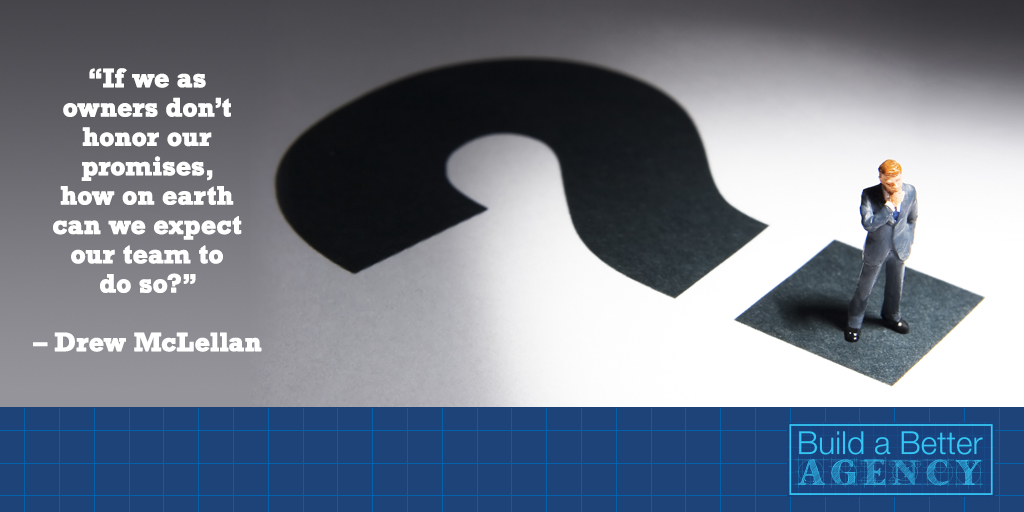We talk to clients about positioning every single day. We walk them through differentiation strategies. When they don’t take our advice, we walk away shaking our heads. However, guess who is lousy at taking our own medicine!
I say this all the time, but it bears repeating: Being a generalist is not going to cut it in today’s marketplace. Getting clear on your subject-matter expertise – the heart of your differentiation – has never been more important. I don’t think there is a way to overstate that point.
On episode #181 of Build a Better Agency, I talk with David C. Baker, who has seen it all as a consultant, often working with design firms and agencies. It’s why he wrote the book “The Business of Expertise.”
He speaks regularly on more than 70 topics relevant to entrepreneurial expertise and also appears as a guest on many entrepreneurial focused podcasts.

What You Will Learn in This Episode:
- The most egregious mistake agency owners make
- Why “seats on the agency bus” does not always equal success
- Why establishing subject-matter expertise is more important than ever
- The ideal numbers of prospects and competitors that define strong differentiation
- How to measure and demonstrate your subject-matter expertise
- Why your geographic reach is an important metric
- Why employees are not as interchangeable as they once were
- How to elevate training in agency culture
- Why 85% of agencies are niched vertically
Ways to Contact David C. Baker:
- Website: davidcbaker.com
Agencies have an accountability problem and it starts at the top.
Every day, as owners and team members we make promises to our team. I’ll get the copy to you by 5.” Or, “I’ll have my part of the RFP done by Tuesday.” You’ve heard yourself making those commitments and then you hear that voice in the back of your head say, “I hope.”
If we as owners can’t honor our promises, how on earth can we expect our team to honor theirs? As owners and principals, we overfill our schedules. We overpromise – and guess what? The natural outcome of that is we under deliver, let down our team and set up a pattern where pretty soon, they take everything we say with a big grain of salt.
Everything we do, internally and externally, is deadline driven. If you’re wondering why your employees don’t seem to worry about deadlines or other commitments, like budgets, look no further than your mirror. Odds are, without knowing it, you’ve taught them that the promises we make are “fluid.”
We must be accountable – and hold our teams accountable – for time commitments.
This episode of Build a Better Agency is a solocast. It’s all about providing more leadership in our promises to deliver projects (or answers, or whatever the deliverable may be) on time. We’re all incredibly busy, and too often we use that – and accept that – as an excuse.
You don’t want your agency to be a place whose staff members don’t respect each other enough to keep their promises. And you don’t want your agency to let down or embarrass clients because you didn’t deliver something on time. These are the games we play when we don’t take our time commitments seriously, and they have to stop. Accountability is the key to honoring our word and earning our team and clients’ confidence.
Dig into this issue with me and let’s examine a culture that is reluctant to say no. Let’s look at how we track (or don’t track) our time and our employees’ time. Our goal is not to micromanage or pad billable hours but to get a clear handle on whom and what it really takes to deliver on a project so that we are putting enough time in the calendar to get it done on time and within budget.

What You Will Learn on This Episode:
- The difference between expectation and agreement
- Why accountability for deadlines starts with you
- How to put more breathing room into your calendar so you can honor your agreements
- The life-changing magic of timesheets
- Why internal deadlines are at least as important as client deadlines
- How to build a traffic management function into an agency of any size
- How to make accountability a lived core value within your agency
Drew McLellan is the CEO at Agency Management Institute. He has also owned and operated his own agency since 1995 and is still actively running the agency today. Drew’s unique vantage point as being both an agency owner and working with 250+ small- to mid-size agencies throughout the year gives him a unique perspective on running an agency today.
AMI works with agency owners by:
- Leading agency owner peer groups
- Offering workshops for owners and their leadership teams
- Offering AE Bootcamps
- Conducting individual agency owner coaching
- Doing on-site consulting
- Offering online courses in agency new business and account service
Because he works with those 250+ agencies every year — Drew has the unique opportunity to see the patterns and the habits (both good and bad) that happen over and over again. He has also written two books and been featured in The New York Times, Forbes, Entrepreneur Magazine, and Fortune Small Business. The Wall Street Journal called his blog “One of 10 blogs every entrepreneur should read.”
Helpful Resources from this Episode:
- Weekly Podcast Giveaway: agencymanagementinstitute.com/podcastgiveaway
Ways to contact Drew McLellan:
- Email: drew@agencymanagementinstitute.com
- LinkedIn: www.linkedin.com/in/drewmclellan
The number one barrier to growth for agencies in 2019 is staffing. Agencies are struggling to find and keep good talent. And that conversation always leads to the topic of culture. When we think about culture – we often think about the fun stuff – parties, bonuses, and recognizing people for going above and beyond for clients.
All of that is super important but it is also equally critical to instill a culture that seeks, celebrates, and rewards growth. What are the attributes of a growth culture – and how do you make sure your agency has it?
A longtime practitioner in this area of creating a growth culture inside your agency is my guest on this episode: Doug Austin. In this episode, we talk about why that is the key to, in Doug’s words, “having permission to win that business.”
Doug has been doing agency work for many years and now spends his time as a consultant, working with agency owners and leaders to create a culture of growth in their business. We’re going to dig deep into what a growth culture means and how to get it.
What You Will Learn in This Episode:
- The steps of a four-tiered plan for growth and innovation
- Why it is important to know your client’s business inside and out
- How to build training in the industries you serve into your overall training program
- How to write a brief that makes sense to your client
- Best practices for setting up training for agency employees
- Creating a culture of growth
- Building a culture based on the worth of all people and doing the best work you can
- The connection between continuous learning and a culture of growth
- How to perform a service audit of your agency
- Dealing effectively with culture culprits
Ways to Contact Doug Austin:
- Website: austinamplifies.com
- LinkedIn: https://www.linkedin.com/in/doug-austin-b978915/
Agency owners are notoriously ill-informed (and uncomfortable) when it comes to their agency’s finances. Which means they make important decisions in the dark. Not ideal and we’re trying to change that at AMI. That doesn’t mean you need to understand all the fine-grain details. But you do have to understand where you stand financially at any given time.
On episode #178, I talk with Jenn McCabe, who started out in accounting at Ogilvy and Mather but soon started her own accounting firm to help small to midsized agencies figure out their numbers.
The numbers you need to know (and if you do any AMI planning, this will sound familiar) should fit on one sheet of paper. We’re not talking about miles and miles of Excel spreadsheets. Just the key figures and concepts you need to understand your agency’s financial health.
We’ll also talk about best practices for preparing your agency for sale when the time comes.
Recently Jenn merged her company with Armanino. They provide, among many other services, outsourced accounting, finance, and HR, working primarily with agencies to create simple accounting dashboards and financial documents that allow the agency owner to make good decisions.

What You Will Learn in This Episode:
- The difference between cash accounting and accrual accounting (and why you NEED to know the difference)
- The need for accounting rather than bookkeeping
- Understanding run rate, aka your monthly “nut”
- Why you need to pay yourself as an owner
- Best practices around owner salary
- How much cash and cash equivalents to keep liquid and available
- How to be an attractive acquisition target
- Transitioning your employees to new owners
- Managing an internal agency purchase
- Why management buyouts are becoming less common
Ways to Contact Jenn McCabe:
- Website: armaninollp.com
- LinkedIn: https://www.linkedin.com/in/jennifer-mccabe-3766283/